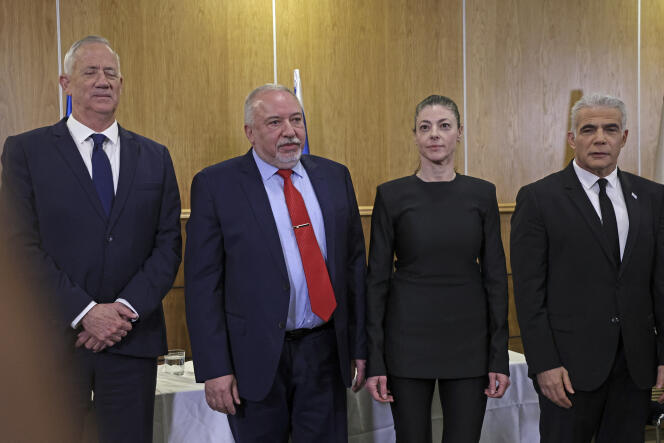


Benjamin Netanyahu reluctantly entered a new war in Gaza on Saturday, October 7, at the head of the most radical government in Israel's history, which formed barely nine months ago and which may not survive it. Since Saturday evening, the Israeli prime minister has been discussing with his main opponents the formation of a government of national unity for the duration of the fighting.
On Sunday, former chief of staff Benny Gantz (center-right), publicly offered his services. He said he would be willing to join the government "with the intention of establishing a war cabinet that will direct the battlefront against Gaza and other fronts," until the end of hostilities. On Monday morning, a number of government figures agreed with him, including Finance Minister Bezalel Smotrich, leader of the far-right. The boss of the centrist opposition Yesh Atid party, Yair Lapid, also said he was ready for it as early as Saturday, but demanded as a precondition that the prime minister get rid of Smotrich and his other far-right ministers.
According to him, Netanyahu knows that "the extreme and dysfunctional composition of the current cabinet" cannot handle a war. Avigdor Lieberman (Yisrael Beiteinu, far right), the opposition leader most viscerally hostile to the prime minister, also said he was ready to join his government, provided its aim was to "eliminate the Hamas terror organization and all its terrorist leaders."
These opposition parties have already expressed their support for Netanyahu. "At times like these, there is no opposition or coalition in Israel. We will give full backing to the security forces for a harsh response against terrorism and its proxies," Lapid said on Saturday.
The citizens' movements that have been opposing Netanyahu's justice reform since January also committed their support: They put an end to their demonstrations and have been trying to mobilize their networks to make themselves useful to the people in the south who have been attacked by Hamas.
But how long can this national unity last, when the country's divisions have been on full display for the past nine months, even within the armed forces? This national crisis has certainly prompted Hamas to take action now. Part of public opinion is bound to question Netanyahu's war ambitions in the future, should he get bogged down in a ground operation, and should hostilities involve the Palestinian Islamist movement's regional allies, such as the Lebanese Hezbollah.
Netanyahu will have the greatest difficulty separating himself from his radical allies, the core and crucial loyalists who returned him to power in December 2022. But their influence looks set to be damaging in terms of this crisis. Supremacist and messianic, with a clear commitment to the ethnic cleansing of all Palestinian territories, they have a vested interest in an all-out war in Gaza and a flare-up in the Israeli Arab territories and cities, where they have been fanning tensions for months.
You have 21.69% of this article left to read. The rest is for subscribers only.
